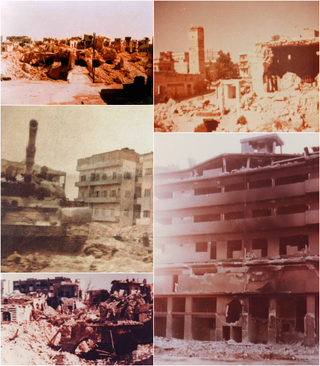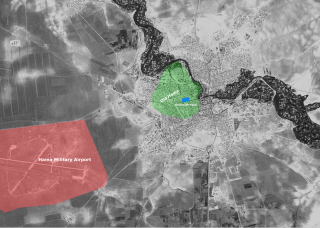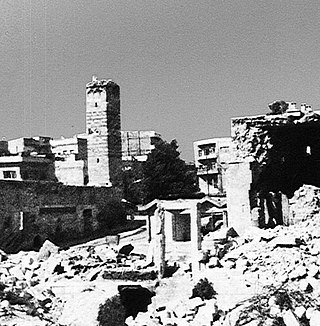Hama massacre may refer to:

Hama is a city on the banks of the Orontes River in west-central Syria. It is located 213 kilometres (132 mi) north of Damascus and 46 km (29 mi) north of Homs. It is the provincial capital of the Hama Governorate. With a population of 996,000, Hama is one of the four largest cities in Syria, with Damascus, Aleppo and Homs, it's also home to the dessert of Halawet el Jibn

The Hama massacre occurred in February 1982 when the Syrian Arab Army and the Defense Companies paramilitary force, under the orders of President Hafez al-Assad, besieged the town of Hama for 27 days in order to quell an uprising by the Muslim Brotherhood against the Ba'athist government. The campaign that had begun in 1976 by Sunni Muslim groups, including the Muslim Brotherhood, was brutally crushed in an anti-Sunni massacre at Hama, carried out by the Syrian Arab Army and Alawite militias under the command of Major General Rifaat al-Assad.

The Muslim Brotherhood in Syria is a Syrian branch of the Sunni Islamist Muslim Brotherhood organization. Its objective is the transformation of Syria into an Islamic state governed by Sharia law through a gradual legal and political process.

Rifaat Ali al-Assad, known as the "Butcher of Hama", is a Syrian former military officer and politician. He is the younger brother of the late President of Syria, Hafez al-Assad, and Jamil al-Assad, and the uncle of the former President Bashar al-Assad. He was the commanding officer of the ground operations of the 1982 Hama massacre ordered by his brother.
Al-Aqsa mosque compound, also known as al-Masjid al-Aqṣā, is a religious site in Jerusalem located on the area of land known as both the Temple Mount and Haram al-Sharif by Jews and Muslims respectively.

Hama Governorate is one of the 14 governorates of Syria. It is situated in western-central Syria, bordering Idlib and Aleppo Governorates to the north, Raqqa Governorate to the east, Homs Governorate to the south, and Tartus and Latakia Governorate to the west. It is the only Governorate that does not border a foreign country. Measures of its area vary from 8,844 km2 to 8,883 km2, with its capital being the city of Hama.
Syrian protests may refer to:

The 1964 Hama riot was the first significant clash between the newly installed Ba'ath Party leadership of Syria and the Muslim Brotherhood. It occurred in April 1964, after the 1963 Ba'athist coup d'état. The insurrection was suppressed with heavy military force, resulting in many mortal casualties and partial destruction of the old Hama city neighborhoods. Hama continued to be a center of Islamists and a focal point of the 1976-1982 Islamist uprising in Syria.

The Islamist uprising in Syria comprised a series of protests, assassinations, bombings, and armed revolts led by Sunni Islamists, mainly members of the Fighting Vanguard and, after 1979, the Muslim Brotherhood, from 1976 until 1982. The uprising aimed to establish an Islamic republic in Syria by overthrowing the neo-Ba'athist government, in what has been described by Ba'ath Party as a "long campaign of terror".

The 2011 siege of Hama was among the many nationwide crackdowns by the Syrian government during the Syrian revolution, the early stage of the Syrian civil war. Anti-government protests had been ongoing in the Syrian city of Hama since 15 March 2011, when large protests were first reported in the city, similar to the protests elsewhere in Syria. The events beginning in July 2011 were described by anti-government activists in the city as a "siege" or "blockade".

Shabiha is a colloquial and generally derogatory term for various loosely-organised pro-government Syrian militias and private military companies loyal to the Assad family prior to the collapse of the Assad regime, used particularly during the initial phase of the Syrian civil war. As the war evolved, many groups that had previously been considered shabiha were amalgamated into the National Defence Force (NDF) and other paramilitary groups.
The Aleppo Artillery School massacre was a sectarian massacre of Syrian Army cadets on 16 June 1979. It was carried out by a handful of members of the Muslim Brotherhood's Fighting Vanguard led by Adnan Uqlah and Ibrahim al-Youssef, without the permission of the leader of the Fighting Vanguard, Hisham Jumbaz. The Muslim Brotherhood in Syria later tried to cover up their involvement in the massacre by condemning it, but the Syrian government decided to conduct a large-scale crackdown against it to prevent any reoccurrence.
Hama uprising may refer to:
The following is a timeline of the Syrian Civil War from January to April 2012, during which time the spate of protests that began in January 2011 lasted into another calendar year. An Arab League monitoring mission ended in failure as Syrian troops and anti-government militants continued to do battle across the country and the Syrian government prevented foreign observers from touring active battlefields, including besieged opposition strongholds. A United Nations-backed ceasefire brokered by special envoy Kofi Annan met a similar fate, with unarmed UN peacekeepers' movements tightly controlled by the government and fighting.
The Hama Governorate clashes were a series of incidents of fighting during late 2011 and early 2012 in the Syrian Governorate of Hama, as part of the Early insurgency phase of the Syrian Civil War.
The Al-Qubeir massacre, also known as the Hama massacre, occurred in the small village of Al-Qubeir near Hama, Syria, on 6 June 2012 during the country's ongoing civil conflict. Al-Qubeir is described as a Sunni farming settlement surrounded by Alawite villages in the central province of Hama. According to preliminary evidence, troops had surrounded the village which was followed by pro-government Shabiha militia entering the village and killing civilians with "barbarity," UN Secretary-General Ban Ki-moon told the UN Security Council.
Siege of Aleppo may refer to:
The Aqrab massacre is a contested event which occurred on 10/11 December 2012, during the Syrian civil war, in the Alawite section of the mixed town of Aqrab, Hama Governorate, Syria. The Syrian Observatory for Human Rights claimed that 125 people were killed or wounded in those events, while other activists claimed that as many as 300 people were killed. Activists said that they could confirm the deaths of 10 people.

The Syrian Revolution, also known as the Syrian Revolution of Dignity and the Syrian Intifada, was a series of mass protests and civilian uprisings throughout Syria – with a subsequent violent reaction by Ba'athist Syria – lasting from February 2011 to December 2024 as part of the greater Arab Spring in the Arab world. The revolution, which demanded the end of the decades-long Assad family rule, began as minor demonstrations during January 2011 and transformed into large nation-wide protests in March. The uprising was marked by mass protests against the Ba'athist dictatorship of president Bashar al-Assad meeting police and military violence, massive arrests and a brutal crackdown, resulting in hundreds of thousands of deaths and tens of thousands wounded. 13 years after the start of the revolution, the Assad regime fell in 2024 after a series of rebel offensives.
The Hama offensive may refer to a number of offensives launched by either armed Syrian opposition forces toward city of Hama or by Syrian government forces against rebels north of Hama throughout the Syrian civil war.